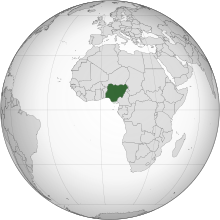
Back Нигериа Abkhazian Nigeria ACE Нигерие ADY Nigerië Afrikaans Nigeria ALS ናይጄሪያ Amharic Nigeria AMI Nicheria AN Nigeria ANG Naijiria ANN
Federal Republic of Nigeria | |
|---|---|
| Motto: "Unity and Faith, Peace and Progress" | |
| Anthem: "Nigeria, We Hail Thee" | |
| Capital | Abuja 9°4′N 7°29′E / 9.067°N 7.483°E |
| Largest city | Lagos |
| Official languages | English |
| National languages | |
| Other languages[2] | Over 525 languages[1] including: |
| Ethnic groups (2018)[3] | |
| Demonym(s) | Nigerian |
| Government | Federal presidential republic |
| Bola Tinubu | |
| Kashim Shettima | |
| Ahmed Lawan | |
| Femi Gbajabiamila | |
| Olukayode Ariwoola | |
| Legislature | National Assembly |
| Senate | |
| House of Representatives | |
| Independence from United Kingdom | |
| 1 October 1960 | |
| 1 October 1963 | |
| 29 May 1999 | |
| Area | |
• Total | 923,769 km2 (356,669 sq mi) (31st) |
• Water (%) | 1.4 |
| Population | |
• 2021 estimate | 211,400,708[4] (7th) |
• 2006 census | 140,431,691 |
• Density | 218/km2 (564.6/sq mi) (42nd) |
| GDP (PPP) | 2021 estimate |
• Total | $1.116 trillion[5] (25th) |
• Per capita | $5,280 (129th) |
| GDP (nominal) | 2021 estimate |
• Total | $514.079 billion[5] (29th) |
• Per capita | $2,432 (137th) |
| Gini (2020) | medium |
| HDI (2019) | low · 161st |
| Currency | Naira (₦) (NGN) |
| Time zone | UTC+01:00 (WAT) |
| Driving side | right[8] |
| Calling code | +234 |
| ISO 3166 code | NG |
| Internet TLD | .ng |
Nigeria, officially Federal Republic of Nigeria, is a country in Africa. It gained independence in 1960 and became a republic in 1963. It is the most populated country in both West Africa and all of Africa, with over 232,679,478 people.[9] Its capital is Abuja while its economic center and most populated city is Lagos. Nigeria is the fourth biggest economy in Africa.[10][11]
- ↑ Blench, Roger (2014). An Atlas Of Nigerian Languages. Oxford: Kay Williamson Educational Foundation.
- ↑ "Languages of Nigeria". Ethnologue. Retrieved 12 September 2010.
- ↑ "Africa: Nigeria". The World Factbook. Central Intelligence Agency. Retrieved 21 June 2020.
- ↑ "Nigeria Population Growth Rate 1950-2021". macrotrends. Retrieved 21 June 2021.
- ↑ 5.0 5.1 "World Economic Outlook Database, October 2020 – Nigeria". International Monetary Fund. Retrieved 15 October 2020.
- ↑ "Poverty and Inequality Index". National Bureau of Statistics. Archived from the original on 13 April 2021. Retrieved 8 June 2020.
- ↑ Human Development Report 2020 The Next Frontier: Human Development and the Anthropocene (PDF). United Nations Development Programme. 15 December 2020. pp. 343–346. ISBN 978-92-1-126442-5. Retrieved 16 December 2020.
- ↑ Akinbode, Ayomide (2 April 2019). "Why Nigeria changed from Right-Hand Drive to Left-Hand Drive in 1972". www.thehistoryville.com. Archived from the original on 9 July 2021. Retrieved 9 July 2021.
The terms 'right- and left-hand drive' refer to the position of the driver in the vehicle and are the reverse of the terms 'right- and left-hand traffic'.
- ↑ Population Total,
- ↑ "Nigeria becomes Africa's largest economy". aljazeera.com. Retrieved 11 August 2015.
- ↑ Vanek, Monique (18 April 2024). "Nigeria's Economy, Once Africa's Biggest, Slips to Fourth Place". Bloomberg. Retrieved 2 July 2024.



